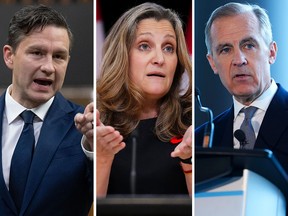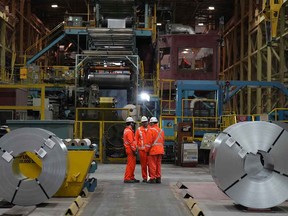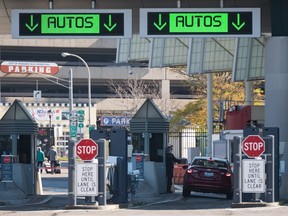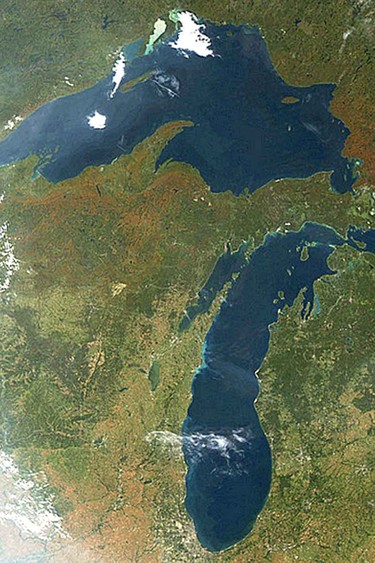Trudeau was considered an enemy of the energy industry. Would any of the possible candidates mend fences?
Article content
Prime Minister Justin Trudeau‘s decision to step down in March will mark the end of a tumultuous era in the Canadian oilpatch that put the country’s energy sector on a collision course with a growing climate movement, the rise of green investing and organized political opposition to pipelines.
Article content
Article content
During that time, many in the sector became convinced that Trudeau, despite early claims to the contrary, was an enemy of the energy industry and bent on prematurely sunsetting Canadian production of oil and gas.
Advertisement 2
Article content
In a more generous mood, his oilpatch critics allow that his government salvaged the Trans Mountain pipeline expansion (TMX) when Kinder Morgan Inc. threatened to walk away in 2018, a move that has opened new markets for Canadian crude and narrowed the discount on barrels of Western Canadian Select (WCS).
Trudeau troubles
But beginning with Trudeau’s ban on oil tanker traffic off the coast of northern British Columbia — which effectively killed Enbridge Inc.’s Northern Gateway pipeline project — and continuing with policies such as Bill C-69, the Impact Assessment Act (dubbed by Jason Kenney the “No More Pipelines” act), his tenure was a fraught time for oil and gas development.
TC Energy Corp. scrapped its Energy East pipeline project in 2017, amid shifting regulatory requirements and environmental opposition. The Joe Biden administration in the United States would cancel Keystone XL in 2021.
By the time the federal Liberals began work on an oil and gas emissions cap, there was virtually no goodwill remaining in the sector towards Trudeau or his government, despite its approval of Enbridge’s Line 3 expansion and Ottawa’s assistance in fighting Michigan’s bid to shut down Line 5, which carries oil from Western Canada through the state to Sarnia, Ont.
Advertisement 3
Article content
The proximity and bitterness of the Trudeau years make it unlikely the next Liberal leader, regardless of who assumes the helm, could hope to receive a warm reception in the oilpatch.
“It’s Liberal policies; it’s not necessarily one individual where our challenges in Canada have come (from), and I think that Mark Carney would be more of the same,” Whitecap Resources Inc. chief executive Grant Fagerheim said.
“We have to bring our country back and give another political group, the Conservatives, an opportunity to see what they can do.”
Trudeau’s decision to prorogue Parliament until the Liberal Party selects a new leader has set the stage for a likely spring election.
A truncated Liberal leadership race comes at a precarious moment as Canada scrambles to respond to the threat of tariffs made by U.S. president-elect Donald Trump, with his inauguration just days away.
“It’s very unfortunate that at this critical moment in time, (we) don’t have our ducks in a row with Canadian leadership,” Lisa Baiton, president of the nonpartisan Canadian Association of Petroleum Producers (CAPP), said.
Article content
Advertisement 4
Article content
“It’s incredibly important for our federal leaders to send a signal that Canada is ready to invite investment into our resource sector and be a secure supplier of energy in the world and we really need to move quickly to get our act in order on a timeline that benefits Canadians and not partisan politics.”
Just get out of our way, let us do our job, and we’ll make the country a lot of wealth
anonymous source on political sentiment in the oilpatch
But even though Alberta might be broadly perceived as a wasteland when it comes to federal Liberal votes, Canada’s oilpatch isn’t a political monolith. A broad range of political views is represented in the boardrooms of the country’s oil and gas companies.
One oilpatch leader, who asked not to be identified, said the dominant political sentiment in the sector could best be summarized as “just get out of our way, let us do our job, and we’ll make the country a lot of wealth.”
But that mantra has evolved in some corners of the industry in response to a regulatory push to reduce the sector’s outsized greenhouse gas emissions and the rise of voluntary net-zero commitments.
Canada’s largest oilsands companies have proposed a massive decarbonization project that relies on industrial carbon pricing that has been pushed forward by the Liberals.
Advertisement 5
Article content
Besides the price on carbon, getting a positive final investment decision on the $16.5-billion Pathways Alliance carbon-capture project could ultimately rely on investment tax credits and financing from the federal government or Crown corporations.
Some supporters of the mega-project may be wary of Conservative Leader Pierre Poilievre, who has promised to repeal the consumer carbon tax, but has not clarified his view of industrial carbon pricing and other measures.
Pathways Alliance declined to comment for this story.
We’re looking for someone that realizes Canada needs to really pivot in a substantive way
Tristan Goodman, president of the Explorers and Producers Association of Canada
Poilievre’s rhetoric against corporate subsidies and tax benefits going to multinational companies holds particular appeal for the sector’s smaller conventional producers, some of whom perceive the oilsands majors as holding out for public investment to decarbonize while the rest of the sector has moved to slash emissions in response to tightening methane regulations.
“We’re looking for someone that realizes Canada needs to really pivot in a substantive way,” Tristan Goodman, president of the Explorers and Producers Association of Canada, said. “It’s got to focus on growth and removal of barriers to really give investors certainty. They don’t want any more false promises.”
Advertisement 6
Article content
Oilpatch leaders and investors will be closely watching the outcome of the Liberal leadership race, particularly the statements made by Mark Carney, who is a less-known quantity in the sector despite his global profile.
The Liberal who may have stood the best chance of securing the goodwill of oilpatch leaders, former B.C. premier Christy Clark, announced on Tuesday that she won’t be entering the race. Her credibility with the sector comes from courting investment and shepherding negotiations that ultimately led to Canada’s first liquefied natural gas facility in Kitimat, B.C.
Clark struck an uneasy balance between economic growth and the environment during her time in office. She pushed the Site C dam hydroelectric mega-project forward in the face of vociferous political and environmental opposition, and the 1,100-megawatt dam will be in service later this year amid rising demand for clean power from population growth, industrial development, electric vehicles and heat pumps.
Her candidacy might have resonated with oilpatch centrists concerned about Canada’s economic growth and faltering infrastructure investment.
Advertisement 7
Article content
The Liberal leadership race is now shaping up to be a two-way battle between former central banker Carney and former deputy prime minister Chrystia Freeland. Carney announced his intention to run Thursday afternoon in Edmonton, while Freeland’s announcement on whether she will run is expected next week.
Recommended from Editorial
-

Who is Mark Carney, the man who could be Liberal king?
-

Forget Trump, Canada’s own trade barriers amount to nearly 25% tariff
-

‘Great deal:’ Pierre Poilievre makes energy pitch to Trump
Here is a look at what the Liberal frontrunners and Conservative leader Pierre Poilievre have said and done on energy:
Mark Carney
Carney, the former governor of both the Bank of Canada and the Bank of England, was born in the Northwest Territories, but grew up in Edmonton.
The 59-year-old soft-launched his bid to be the Liberals’ leader with an appearance on the Daily Show this week that energized partisans, but likely not the oilpatch, with his response to host Jon Stewart’s question about making climate action more politically palatable.
“The vast majority of emissions in Canada come from our industry. In fact, almost 30 per cent of our emissions in Canada come from the production and shipment of oil to the United States,” he said. “So, part of it is cleaning that up, getting those emissions down, more than changing, in a very short period of time, the way Canadians live.”
Advertisement 8
Article content
Such statements that signal an intention to zero in on the energy sector will undoubtedly provoke some in the oilpatch, though few can be surprised that he would double down on heavy emitters when he also plans to cut the carbon tax on consumers, as he has reportedly said he plans to do.
However, Carney has also said he opposes a cap on oil and gas emissions and favours projects such as the Pathways Alliance carbon capture and storage project to reduce the sector’s greenhouse gases.
The former Goldman Sachs Group Inc. investment banker is currently the UN special envoy for climate action and finance and co-chair of the embattled Glasgow Finance Alliance for Net Zero, whose green banking alliance has experienced an exodus of several large U.S. banks following Trump’s re-election. Royal Bank of Canada and Bank of Montreal are thinking of leaving the alliance as well, according to Bloomberg.
Carney’s current chairmanship of Brookfield Asset Management Ltd. in an environmental, social and governance (ESG) investment-focused role has somehow been a lightning rod for criticism from both environmentalists and oil bulls. Green groups have condemned the firm’s investments in fossil fuels, while his dedication to climate finance has been derided in the backlash against ESG.
Advertisement 9
Article content
His first toe-to-toe with Poilievre occurred at a 2021 parliamentary committee meeting when the Conservative leader accused him of employing a “double standard” in supporting the cancellation of the Northern Gateway pipeline while Brookfield invested in pipelines abroad. Brookfield did and does have Canadian energy holdings as well, including oilsands pipeline operator Inter Pipeline Ltd.
Chrystia Freeland
His chief competitor to be Liberal leader seems to be Chrystia Freeland, 56, an Alberta-born Rhodes scholar, former journalist and one-time finance minister who is yoked to Trudeau’s legacy in the eyes of the oilpatch, including policies deeply unpopular with the sector, such as Bill C-69 and the oil and gas emissions cap.
However, some say she was also one of the most informed members of the Trudeau cabinet on energy matters and an articulate advocate for the Liberal government’s purchase of Trans Mountain, calling it a “great national project” in her last budget speech.
Freeland’s headline-grabbing Brookings speech in 2022 called for “friend-shoring” and the fast-tracking of Canadian energy and mining projects to boost exports and trade with friendly liberal democracies, rather than leaving allies dependent on supply from autocracies such as Russia and China. The remarks caused a stir, but failed to yield regulatory changes that could drive investment.
Advertisement 10
Article content
She was also perceived by the sector as being one of the few proponents of the Pathways Alliance project within the Trudeau cabinet. Sources say she will scrap the consumer carbon tax, too.
Pierre Poilievre
Chomping at the bit for an election, of course, is Poilievre.
The Calgary-born career politician, who has served as an Ottawa-area MP since 2004, won the leadership of the Conservative Party in 2022 and is now favoured to win the next election.
Several oilpatch leaders said they believe Carney and Freeland to be cut from the same cloth as Trudeau on issues related to energy and the environment. As a result, many will be looking to Poilievre, 45, to decisively turn the page on the Trudeau years.
His blunt rhetorical style was on display in a recent press conference when he talked about the threat of U.S. tariffs and the likelihood of a widening discount on Canadian crude.
“The answer to that is to stop being stupid and start building LNG plants, pipelines, refineries, upgraders and other energy infrastructure so that we can sell our energy to the world without going through the Americans,” he said on Jan. 9.
Advertisement 11
Article content
Poilievre has pledged to repeal Bill C-69, telling a large gathering of Calgary supporters in 2022 that he would “clear the way for pipelines” and support pipeline projects heading south, north, east and west.
The oilpatch, however, has been looking for clarity on Poilievre’s intentions on several key policy points, including investment tax credits for carbon capture, financing for carbon capture through entities such as the Canada Growth Fund and the industrial price on carbon.
• Email: mpotkins@postmedia.com
Bookmark our website and support our journalism: Don’t miss the business news you need to know — add financialpost.com to your bookmarks and sign up for our newsletters here.
Article content
How Alberta’s oil patch views Carney, Freeland and Poilievre
2025-01-16 17:03:50








